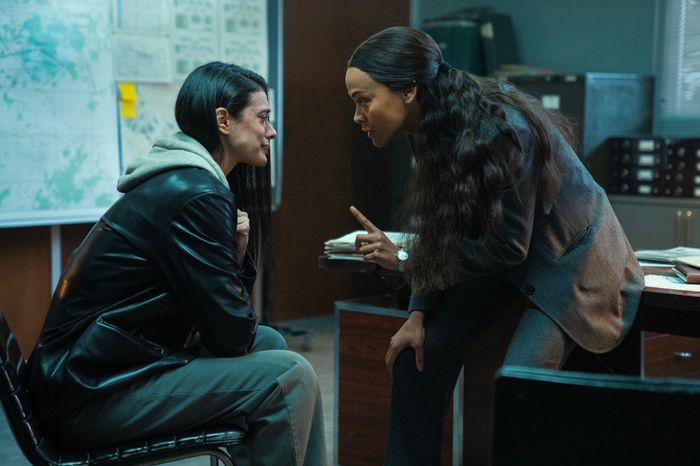
Spoilers follow for the first season of the Paramount+ series Special Ops: Lioness.
Taylor Sheridan’s preference for rah-rah Americana crossed with soapy melodrama can make for a short mental shelf life. Special Ops: Lioness — a mash-up of the Islamophobia of Sheridan’s Sicario: Day of the Soldado with the nearly fascist righteousness of Kathryn Bigelow’s Zero Dark Thirty — is so convolutedly plotted and politically cynical that little sticks. Eight episodes of compressing the entire Middle East into one broadly nefarious entity, a Zoe Saldaña parenting story line wrapped in anti-abortion messaging, a team of CIA assassins whose swaggy assholishness is applauded: It’s all in line with Sheridan’s increasingly reactionary auteurism, and it all left my consciousness nearly immediately.
But more than a week after the finale, “Gone Is the Illusion of Order,” there’s one moment in Lioness I’m still thinking about. In the last few minutes of the episode, after Cruz (Laysla De Oliveira), a U.S. Marine turned CIA Lioness operative, has assassinated a terrorism financier, she turns against her recruiter and handler, Joe (Saldaña). Cruz doesn’t care that the CIA insists that the man funded every terrorist attack since September 11; she knows the agency traffics in lies. She’s disinterested in Joe’s promise that Cruz has now saved lives; she’s convinced all she changed was oil prices. After serving in Afghanistan and Pakistan, Cruz believed her calling was to “protect the weak,” but now she’s convinced of something entirely different: that the continued American presence in the Middle East is a mistake.
“All we did was make the next generation of terrorists,” Cruz says of her mission, a statement that’s still rattling around in my brain due to its dissonance with the rest of Lioness. This upstanding soldier realizing that there are capitalist angles to the American presence in the Middle East that hurt people on both sides but produce profits for shadowy corporations and maintain power for entrenched bureaucrats? Syriana is the GOAT of that genre, but I’ll take any version of it I can get. Sheridan, who wrote or co-wrote all eight Lioness episodes, making a statement about the destructiveness of American imperialism and interventionism, and noting that the “cowboy shit” driving the CIA can be self-defeating? Who knew he still had that kind of nuance in him! The guy who made instant-classic Hell or High Water might be hiding somewhere under Sheridan’s current uniform of gigantic Stetson hat, goofily ornate belt buckle, and American New West fetishization — let him out!
Cruz’s revelation is all the more shocking for how Lioness belabors other clichéd and geopolitically ignorant points, such as sectarian enemies Iran and Saudi Arabia abandoning their decades of conflict to together operate a militia in Iraq. (Despite renewed relations between the two, a team-up of this magnitude probably wouldn’t happen.) Sheridan self-plagiarizes from Sicario: Day of the Soldado with a subplot about Mexican cartels sneaking Al Qaeda operatives across the border for suicide-bombing purposes, and with a presentation of American intelligence agents misleading their assets and dismissing their inner lives to enact their own individual ideas of what’s right and wrong. The series primarily skates by on othering and villainization rather than distinctly voicing what America should do — until that Cruz speech, the closest Lioness comes to declaring its own perspective on what two decades of warmongering has actually accomplished.
This scene is the bitter rock bottom of De Oliveira’s increasingly panic-stricken performance as Cruz, who spends the series stuck between in-over-her-head and brusque-bitch modes. Maybe this is on purpose, because the Lioness program discourages interiority — Joe wants Cruz to follow her orders and not think otherwise — but it results in Cruz feeling ethically thin until this last exchange between handler and asset. When Cruz accepts her pawn status in this mission and the fact that terrorism occurring in the region doesn’t exist in a vacuum but in direct response to America’s continued presence there, De Oliveira lets the character’s exhaustion come through in her weary tone and gasping line delivery, the way she throws her body weight into punching Joe in the face, the way she crumples on the ground of the extraction ship that will take her back to an uncertain future in the U.S. Lioness tosses Cruz between certainty in action scenes and uncertainty in emotional ones, but De Oliveira’s combination of resolution and resentment here is unique, and its idiosyncrasy with her previously established opinions makes it feel more honest, more meaningful, and more like Sheridan using her to state what should be our takeaway about the efficacy of American occupation.
Lioness recurrently says that its homogenized Middle East needs the U.S. to be its adversary because, otherwise, the region’s people — Iranian, Saudi, Kuwaiti, Iraqi, whatever — would discern that their wealthy and out-of-touch leaders are actually their oppressors. That attitude can excuse any kind of regime-change action, and there’s a parallel between how Joe convinces Cruz to join the Lioness program with a speech about protecting the vulnerable and how financier Errol (Martin Donovan) explains to his wife, Kaitlyn (Nicole Kidman), Joe’s boss, that “the leaders we have placed in power need us to be the enemy of their people, or the people will start asking why 0.6 percent of the population has income over $1 million.” War is peace, freedom is slavery, all that stuff. But with Cruz’s “next generation of terrorists” comment, Lioness acknowledges that the same dichotomy applies in the U.S.: Creating enemies abroad helps mask enemies at home, that small number of people with outsize influence, unfathomable wealth, and the murky morality to maintain both. Sheridan’s understanding of that inequality is what helped make Hell or High Water so cathartic and so powerful, and while most of Lioness is a mess, Cruz’s final roar is a welcome bit of ideological bite.


